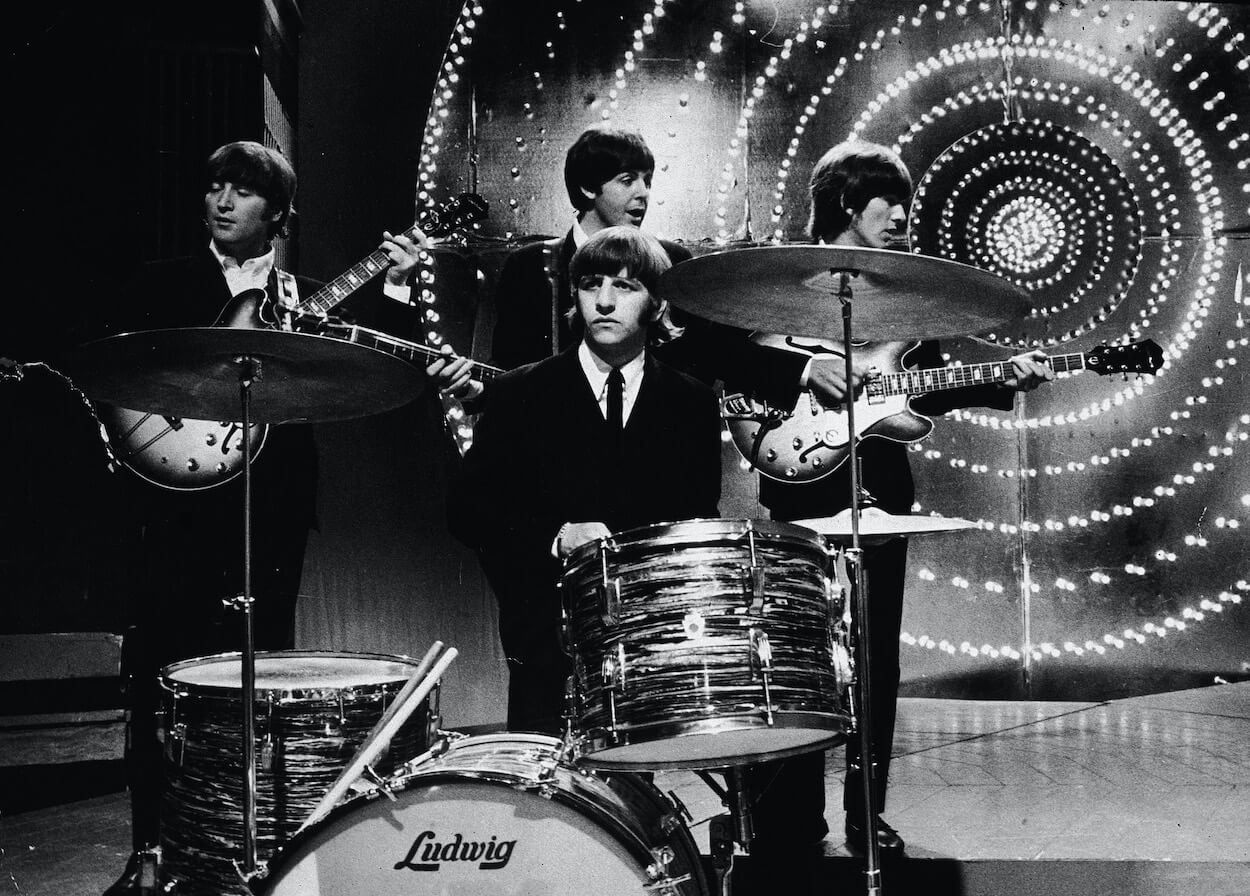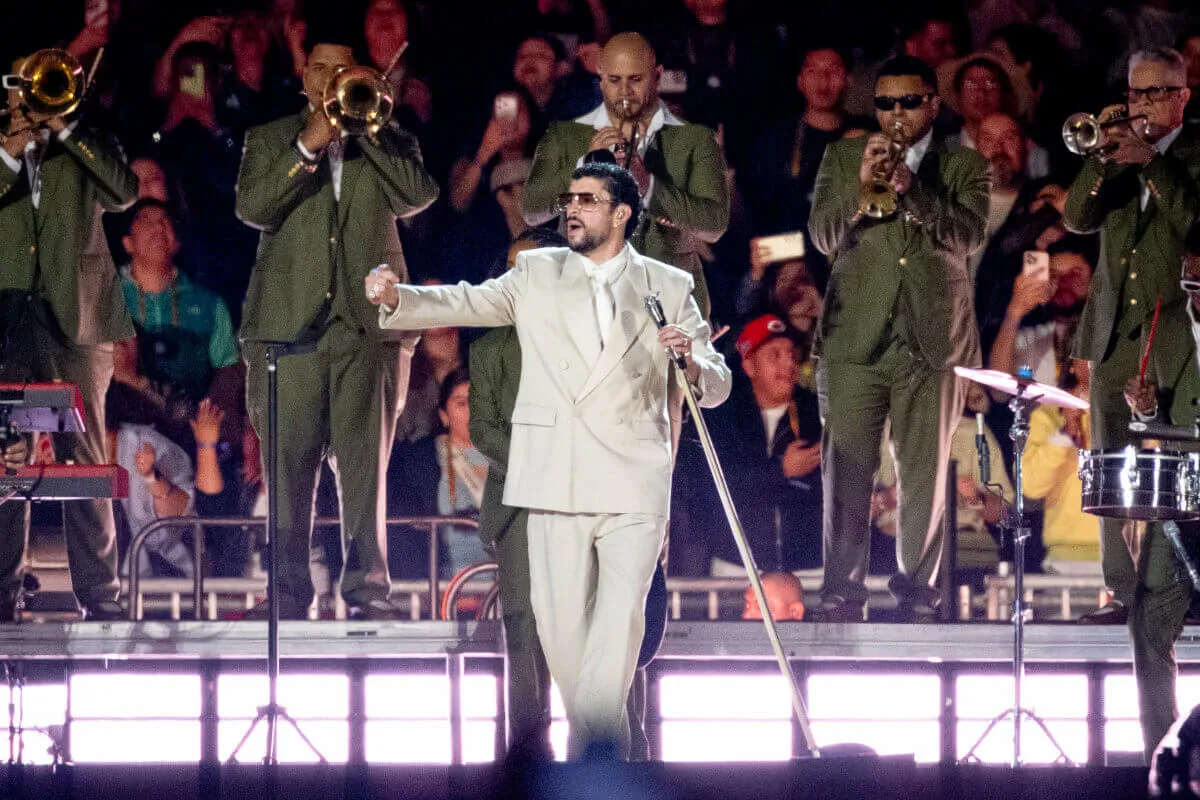
Exploring The Beatles Mystery That the ‘Taxman’ Guitar Solo Shows Up Twice on ‘Revolver’
Every Beatles album has legions of fans, and rightfully so. Still, Revolver might be at (or at least near) the top of the list of their greatest accomplishments. The 1966 record featured so many stellar songs that “Got to Get You Into My Life” became a hit until years later even though fans knew the song well. Revolver also saw the band dive head first into studio experimentation. An enduring Beatles mystery is whether or not they used the “Taxman” solo on another song, albeit in an almost alien way. Did they? Let’s dive deeper into the theory.
Exploring The Beatles mystery that they used the ‘Taxman’ guitar solo on ‘Tomorrow Never Knows’
The Fab Four’s famous Shea Stadium concert in 1965 was one of their most monumental events.
It demonstrated the band’s popularity and power, but the downside was that it was overwhelming and impersonal. That negative side might have been the falling domino that pushed The Beatles on the path to being a studio band only. Once the group committed themselves to being album perfectionists, they created a string of records that became outright classics. Revolver was one of them, even though The Beatles still played live while making it.
George Harrison’s “Taxman” kicked off the album (the first and only time that happened). The catchy complaint song about England’s punishing tax system featured Paul McCartney playing the biting, aggressive guitar solo. George received some lyrical help from John Lennon on the song, but the songwriting credit belonged to Harrison alone.
Meanwhile, John took the lead on “Tomorrow Never Knows.” Revolver’s closing track included tape loops, backmasking, and sonic manipulation. It was one of The Beatles’ most psychedelic songs and paved the way for the sonic experimentation that came later on tunes such as “A Day in the Life,” “It’s All Too Much,” and “I Want You (She’s So Heavy),” and others.
The Beatles worked on both “Taxman” and “Tomorrow Never Knows” on April 22, 1966, though the latter song received most of the attention that day.
One Beatles mystery maintains that the Paul’s “Taxman” solo appeared on “Tomorrow Never Knows,” albeit played backward and a little slower. Is there any merit to that argument? Let’s take a look.
The case for “Taxman” and “Tomorrow Never Knows” sharing a solo
- The guitar tones on “Taxman” and “Tomorrow Never Knows” sound identical. Unless Paul took meticulous notes on the levels he set on his amp, it would have been extremely difficult to replicate the precise sound.
- As the YouTube channel You Can’t Unhear This explains, the reversed “Tomorrow Never Knows” solo (meaning it’s played forward) nearly lines up with a slightly slowed-down “Taxman” solo. The overlap isn’t a perfect circle, but many of the same notes land at the same spots. The Beatles didn’t have digital editing tools in 1966 to make the solos line up precisely, but the could have manually altered the “Tomorrow Never Knows” solo with their analog equipment.
- Furthermore, “Tomorrow Never Knows” featured an array of tape loops, reversed sounds, and tonal manipulation. Lifting the solo from one song, reversing it, and dropping it in another tune would have fit perfectly with The Beatles’ new direction of studio experimentation.
The case against the ‘Revolver’ songs having the same guitar parts
- Because The Beatles worked on “Taxman” and “Tomorrow Never Knows” on the same day, it’s entirely plausible Paul simply repeated an eerily similar solo on both songs. He could have played one solo during one part of the recording session, left his amp settings the same during a break, and then plugged in and played the other guitar line minutes or hours later. That approach wouldn’t necessarily have fit the experimental ethos of “Tomorrow Never Knows,” but repeating the solos almost note-for-note would have been extremely economical since it probably could have happened in one or two takes.
- “Taxman” was a George song. John took the lead on writing the words and music for “Tomorrow Never Knows.” We could see the elitist/artistic purist in John not wanting to share any morsel of his song with another tune, even if it was unrecognizable to all but the most die-hard fans.
The website Beatles Bible contends Paul performed two separate solos on back-to-back days. You Can’t Unhear This makes a strong case for The Beatles using the same performance (or a version of it) twice. The Beatles, producer George Martin, and recording engineer Geoff Emerick are the only people who know for sure how the song came together. In 2023, George, John, and Martin aren’t around to enlighten us. It’s a Beatles mystery that might never be solved.
If “Taxman” and “Tomorrow Never Knows” share variations of the same solo, then it wasn’t the last time The Beatles referenced their own tunes on other songs.
Other times The Beatles referenced their own work
The longer The Beatles’ career lasted, the more self-referential they became. Sometimes it happened on the same record.
On Abbey Road, the final album they recorded together, The Beatles referred back to the melody (and nearly copied many of the lines) from “You Never Give Me Your Money” on the side 2 medley song “Carry That Weight.”
George’s song “Savoy Truffle” from the White Album references Paul’s “Ob-La-Di, Ob-La-Da” on the same record. John’s “Glass Onion” from that album was a one-stop shop for Fab Four callbacks. The tune referenced “I Am the Walrus,” “Strawberry Fields Forever,” “The Fool on the Hill,” “Fixing a Hole,” and “Lady Madonna” in three minutes.
“All You Need Is Love” tossed in some “Yeah, yeah, yeah” lyrics at the end, a nod to “She Loves You.” Rubber Soul’s Ringo Starr-sung song “What Goes On” mentioned the title of A Hard Day’s Night’s “Tell Me Why” twice.
A nearly unsolvable Beatles’ mystery holds that they used Paul’s guitar solo from “Taxman” from Revolver for the album-closing “Tomorrow Never Knows.” Even though the latter guitar part appeared backward, the resemblance between the two is uncanny. Still, we may never know the truth about the latter song’s solo. If the Fab Four indeed referenced their own material on Revolver, then it wasn’t the first or last time they did it.
For more on the entertainment world and exclusive interviews, subscribe to Showbiz Cheat Sheet’s YouTube channel.


